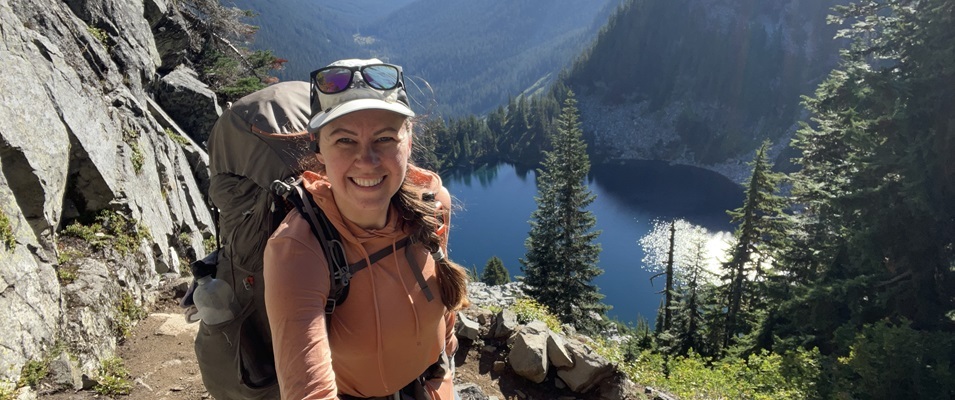
If you ask Rebecca Rempel what brings her deep gratification, she’d tell you it’s challenging her body and mind to the ultimate extreme and coming out on top.
Rempel speaks from experience. This summer, over the course of five and a half months, she hiked more than 3,000 kilometres of rugged terrain to complete the Pacific Crest Trail (PCT).
The PCT is a nationally protected trail running north from the U.S./Mexico border to British Columbia, winding through three states: California, Oregon, and Washington. It’s comprised of over 4,000 kilometres of trail. Rempel had to detour past about 700 kilometres due to forest fires this year. Even so, she’s proud of her accomplishment.
It’s a gruelling trek, and not for the faint of heart. It covers almost every kind of terrain imaginable, from desert to alpine and deep woods to river crossing. This trail intentionally avoids civilization, although villages and towns can be reached off the beaten path in certain areas.
Elevations along the route range from 110 feet above sea level to over 13,000 feet as hikers pass through mountain ranges like the Sierra Nevada.
In recent years, the PCT garnered fame from Cheryl Strayed’s memoir, Wild: From Lost to Found on the Pacific Crest Trail, which went on to inspire a film starring Reese Witherspoon.
But Rempel’s inspiration came from a source much closer to home. Recently, she celebrated her thirty-eighth birthday. This was also the age at which her aunt’s life was cut short due to cancer.
“It hit me in a new light because we were very close,” says Rempel. “She was like a second mom to me. [I realized that] all the time I have yet to live is time that she didn’t have. And it’s not guaranteed that any one of us will have that time.”
For Rempel, this meant taking a hard look at the dreams that still lay dormant within her. Hiking the PCT rose to the top of that list.
Rempel was no amateur hiker. She’s undertaken other famous trails, like the Juan de Fuca on Vancouver Island, the Havasupai Trail in Arizona, and the Kalalau Trail in Hawaii.
A dietitian by day, Rempel also teaches a backpacking course in her free time at Stone Brook Strength in Steinbach. It took months of preparation, she says, to ready herself for the summer-long trek.
On April 6, she set out.
“I stuck my foot through the tall metal fence, touched Mexican soil, and started hiking north,” she says. “For the first thousand miles of my hike, I was what they call a purist. I hiked every single step. Even if [I wandered off the trail], I’d go back to where I started and I would carry on from there.”
Along the way, she says, you naturally meet other hikers and travel together for a time. They become known as your trail family, or in hiking terms, your tramily.
While there are trails that cater to hikers by offering easy to access sleeping accommodations and amenities en route, Rempel says the PCT is not one of them.
“The PCT is not luxurious,” Rempel says. “You’re very much in the wilderness. The longest stretch I did was ten days between towns. It’s very rugged rural.”
Rempel, like many other long-distance hikers, carried a single-person tent on her backpack to provide nightly sleeping accommodations under the stars. Hikers are expected to leave no trace, a policy that requires campers to pitch their tents a certain distance from any natural water source in order to disrupt wildlife as little as possible.
“Some of my favourite nights were sleeping solo. Sometimes I preferred to camp at the top of a ridge or mountain. Just the view was spectacular so I would sometimes climb a little extra just to pitch my tent up there.”
Daily, she rose before the sun, paused from her walking about midday, and took a siesta in her lightweight hammock. After a brief rest, she’d carry on, hiking an average of 12 hours per day.
Occasionally, when there was a town nearby, she’d reward herself with a zero day where no official trail miles were logged. On these days she’d gather groceries, shower, and do her laundry.
The initial stretch of trail Rempel walked took her through desert terrain. Here she came in direct contact with her first wildlife threat; she stepped on a rattlesnake which was hiding beneath a bush that overhung the trail.
“You have to be very careful. If you sit down on a rock or a log, you don’t want to put your hand into any crevice because that’s where the snakes like to hide.”
Thankfully, the snake was scared off and didn’t strike.
Rempel shares other stories of close encounters with black bears, especially in camps when hikers were cooking dinner. They’d been instructed by park rangers on what to do in such a situation: run directly at the bear, making lots of noise—as if you’re the threat.
The tactic proved effective, but not always immediately so.
Mother Nature could prove equally ominous. Rempel is aware of other hikers who have lost her lives on the PCT, some due to altitude sickness and others who were washed away when attempting river crossings.
For Rempel, it was the mountainous regions that required the real grit. Specifically, Mount San Jacinto, which came early in her trek. By the time she arrived, the summit snows were just beginning to melt.
“It’s actually recommended to hike [the mountain trails] with other people. We’d start pretty early in the day, like 4:00 a.m., when it’s still dark and the snow is hard and it’s safe. Then you’d try and get as many miles hiked as you can.”
In this terrain, many dangers await. When snow conditions are soft, hikers can end up post-holing, a situation where the foot pushes through the top layer of snow. When this happens, there is a risk of being impaled by sharp objects beneath the surface.
Blowdowns are another common hurdle. These conditions result from trees falling across the trail, oftentimes massive old growth trees that land in places where the trails are as narrow as 18 inches wide with steep rock cliffs on either side.
In these circumstances, hikers are forced to climb over or under the massive trunk in order to continue on. Rempel recalls nearly losing her grip while ascending a tree that was barkless and slippery and leaned precariously toward a sharp cliff.
She made it, she says, but not without every muscle in her body experiencing spasmic shaking for some time afterward.
In these regions, GPS systems are a must as trails generally aren’t marked. Hikers are also wise to wear spikes on their boots and carry icepicks.
“There was one section where there was nowhere to camp, as we were climbing up the mountain, so we had to continue later into the day than we wanted to. The snow started getting slippery and slushy. And even with one-inch spikes, it was harder to get that bite into the snow. We were walking on this one ridge where it’s very steep. It’s a good long slide down and you’d be pinballing off of trees if you fell. That was the longest point-four miles of my life.”
She describes the trails through Oregon and Washington as somewhat easier. They meander deep into lush old-growth forests, into canyons, and through volcanic landscapes with breathtaking emerald lakes and never-ending hilltop vistas.
Throughout the trip, Rempel wore the SOS device with which she maintained contact with home on a daily basis. The device allowed Rempel to request a change in gear or arrange for extra food to be sent from home. It also helped her keep her backpack at a reasonable weight.
Rempel’s mother Diana waited at home, sending new parcels to destinations where Rempel would soon be scheduled to arrive. She likewise received packages of gear that her daughter no longer needed.
Included in these regular shipments was food. Prior to leaving home, Rempel prepared more than 150 dehydrated meals to be shipped at intervals throughout her trek. These included white wine and mushroom risotto, broccoli cheddar soup, chicken pad thai, and tuna noodle casserole.
These fully cooked, dehydrated options kept hiking life simple. They required only a bit of water, a small pot, a small burner and gas canister, and a spork.
At a few points throughout the journey, Rempel was joined by hiking cohorts. Diana was among them.
“She hiked in six miles and met me on the trail and then we camped for the night,” Rempel says. “There was a waterfall there that goes over a tunnel and you get to hike in behind the waterfall and it’s just beautiful.”
Rempel arrived back at her parents’ home in Niverville in mid-September, feeling accomplished and empowered.
“The PCT kind of taught me that’s it’s possible to achieve your dreams. A lot of the time life is about goals, like getting that car or [chasing] your career. But dreams should happen too.”


















